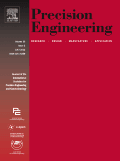
PRECISION ENGINEERING-JOURNAL OF THE INTERNATIONAL SOCIETIES FOR PRECISION ENGINEERING AND NANOTECHNOLOGY
Scope & Guideline
Advancing Precision: Where Engineering Meets Nanotechnology
Introduction
Aims and Scopes
- Precision Manufacturing Techniques:
The journal emphasizes innovative manufacturing techniques such as ultra-precision machining, microfabrication, and advanced machining processes that enhance the quality and functionality of engineered products. - Nanotechnology Applications:
A core area of focus is the application of nanotechnology in various fields, including sensors, materials, and biomedical devices, showcasing how nanoscale innovations can lead to significant performance improvements. - Sensor Development and Characterization:
Research on the development and characterization of advanced sensors, including piezoelectric and electromagnetic sensors, is prominently featured, illustrating their applications in monitoring and measurement. - Materials Science Innovations:
The journal extensively covers advancements in materials science, particularly the development of new composite materials and nanostructured materials, which are critical for enhancing performance in various engineering applications. - Multidisciplinary Approaches:
The journal encourages multidisciplinary approaches, integrating insights from physics, engineering, and biology, to solve complex problems in precision engineering and nanotechnology.
Trending and Emerging
- Advanced Sensor Technologies:
There is a significant increase in research focused on advanced sensor technologies, including wearable sensors and biosensors, driven by the demand for real-time monitoring and health applications. - Nanomaterials and Nanostructures:
The exploration of nanomaterials and their unique properties has surged, particularly in applications related to energy storage, electronics, and biomedical fields, indicating a strong trend towards harnessing nanoscale innovations. - Microsystems and Microfluidics:
Research on microfluidic systems and microsystems has expanded, reflecting their importance in biomedical applications, chemical analysis, and environmental monitoring. - Smart and Adaptive Materials:
The development of smart materials that respond to environmental stimuli is emerging as a key focus area, indicating a trend towards creating materials with enhanced functionalities for diverse applications. - Sustainability in Precision Engineering:
An increasing emphasis on sustainable practices and materials in precision engineering is evident, reflecting broader global trends towards environmentally friendly manufacturing and materials usage.
Declining or Waning
- Traditional Machining Processes:
There has been a noticeable decrease in publications focusing on traditional machining processes as research increasingly shifts towards more advanced, automated, and precision techniques. - Basic Material Characterization Techniques:
Papers centered on fundamental characterization methods for materials have diminished, possibly due to a growing emphasis on integrated, multi-functional characterization approaches. - Conventional Sensor Technologies:
The interest in conventional sensor technologies appears to be waning, as research pivots towards more innovative and advanced sensor systems that leverage nanotechnology. - Low-Temperature Applications:
Research on low-temperature applications and technologies has been less prominent, suggesting a possible shift towards high-performance applications that require more sophisticated temperature management. - Basic Theoretical Studies:
There is a decline in purely theoretical studies without practical applications, as the journal increasingly favors empirical research with demonstrable technological advancements.
Similar Journals

Discover Nano is a pioneering journal published by SPRINGER, dedicated to the rapidly evolving field of nanoscience and nanotechnology. Established in 2023, this innovative platform provides an open-access forum for researchers, professionals, and students to share and disseminate cutting-edge findings in materials science and condensed matter physics. With its commitment to accessibility, Discover Nano encourages a broad spectrum of contributions, aiming to foster collaboration and stimulate discussion in this dynamic area of study. As a new entry into the academic community, the journal holds great potential for growth, aspiring to increase its visibility and impact in the materials science arena, where it currently ranks in the bottom quartile for both materials science and physics categories. Based in Germany and reaching a global audience, Discover Nano represents a significant opportunity for those looking to shape the future of nanotechnology through impactful research and interdisciplinary dialogue.

SENSORS AND MATERIALS
Innovating Tomorrow's Solutions Through Research and CollaborationSENSORS AND MATERIALS is a pivotal academic journal dedicated to the dissemination of research in the fields of instrumentation and materials science. Published by MYU, SCIENTIFIC PUBLISHING DIVISION in Japan, this open-access journal has been fostering innovative research since its inception in 1996. With an ISSN of 0914-4935, it serves as a platform for the scholarly communication of studies that intertwine the developments in sensor technology and materials engineering. As of 2023, it occupies a respectable position in the category quartiles, ranking Q3 in both Instrumentation and Materials Science (miscellaneous), reflecting its commitment to quality research. The journal's Scopus rankings further highlight its relevance, being placed at Rank #317 in General Materials Science and Rank #105 in Instrumentation. With its open-access model, SENSORS AND MATERIALS ensures widespread availability of cutting-edge research that is critical for researchers, professionals, and students engaged in advancing the fields of sensor technologies and material innovations.

JOURNAL OF RUSSIAN LASER RESEARCH
Exploring Innovations in Laser TechnologiesThe Journal of Russian Laser Research, published by Springer, stands as a vital resource for researchers and professionals in the fields of atomic and molecular physics, as well as optics and engineering. With its ISSN 1071-2836 and E-ISSN 1573-8760, this journal has been disseminating groundbreaking research since its inception in 1994, with a dedicated focus on the advancement of laser technologies and their applications. While it currently holds a Q4 classification in both Atomic and Molecular Physics and Engineering categories, its commitment to fostering novel insights and innovative methodologies positions it as a promising platform for emerging studies within these disciplines. Although the journal does not offer open access options, it continues to draw attention with a growing citation index. By publishing diverse research articles, reviews, and critical discussions, the Journal of Russian Laser Research not only enriches academic literature but also serves as a stepping stone for students and professionals seeking to deepen their understanding of laser science and its myriad applications.
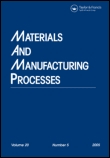
MATERIALS AND MANUFACTURING PROCESSES
Pioneering Research in Materials and Manufacturing Excellence.MATERIALS AND MANUFACTURING PROCESSES, published by Taylor & Francis Inc, is a leading journal dedicated to the dynamic fields of materials science and manufacturing engineering. Established in 1989, the journal has built a formidable reputation, exemplified by its prestigious Q1 rankings in 2023 across various categories, including Industrial and Manufacturing Engineering, Materials Science, Mechanical Engineering, and Mechanics of Materials. With a robust focus on innovative research and the latest advancements in manufacturing techniques and materials application, the journal serves as a vital resource for researchers, professionals, and students alike. The journal is indexed in renowned databases and boasts high impact factors, reflecting its influence in the academic community. Although it does not offer open access, it provides extensive platforms for disseminating crucial findings that push the boundaries of engineering and science. For those seeking impactful research contributions, MATERIALS AND MANUFACTURING PROCESSES remains at the forefront of fostering scholarly dialogue and advancing the field.

Journal of Sensors and Sensor Systems
Advancing Knowledge in Electrical EngineeringThe Journal of Sensors and Sensor Systems, published by COPERNICUS GESELLSCHAFT MBH, is a prominent open-access journal that has been contributing to the fields of electrical and electronic engineering and instrumentation since its inception in 2012. With an ISSN of 2194-8771 and an E-ISSN of 2194-878X, this journal provides a critical platform for researchers, professionals, and students to disseminate innovative findings and advancements in sensor technology and system applications. As of 2023, it holds a respectable ranking in the third quartile for Electrical and Electronic Engineering and in the fourth quartile for Instrumentation, as per Scopus classifications. The journal is based in Göttingen, Germany, and emphasizes the importance of open access for broad dissemination of knowledge. By fostering interdisciplinary research and collaboration, The Journal of Sensors and Sensor Systems plays an essential role in advancing sensor technologies, ultimately driving progress in various scientific and engineering domains.
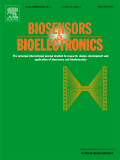
BIOSENSORS & BIOELECTRONICS
Pioneering Research in Biosensors and BioelectronicsBIOSENSORS & BIOELECTRONICS, published by Elsevier Advanced Technology, is at the forefront of research and innovation in the realms of biomedical engineering, biophysics, and biotechnology. Established in 1990, this esteemed journal has established itself as a premier platform, receiving a prestigious Q1 ranking across multiple categories, including Electrochemistry and Nanoscience, reflecting its critical impact on advancing scientific knowledge and technology. With an impressive range of topics, including the latest trends in biosensor development and bioelectronic application, it serves as an invaluable resource for researchers, professionals, and students alike, facilitating collaborative dialogue and innovative solutions. Though primarily subscription-based, the journal is accessible from its UK headquarters in Oxford, promising rigorous peer-reviewed articles that inform future trends and applications in this dynamic field.
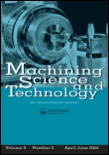
MACHINING SCIENCE AND TECHNOLOGY
Exploring the Intersection of Science and ManufacturingMACHINING SCIENCE AND TECHNOLOGY, published by Taylor & Francis Inc, is a leading academic journal that focuses on the multifaceted disciplines of machining and manufacturing processes, materials science, and mechanical engineering. With an established presence in the field since 1997 and a projection of continued relevance until 2024, this journal plays a critical role in disseminating cutting-edge research and innovative practices within these sectors. The journal holds a significant standing with a Q2 ranking in Industrial and Manufacturing Engineering, Materials Science, and Mechanical Engineering, reflecting its influential contributions to these fields. According to Scopus rankings, it positions itself in the top percentiles, showcasing its commitment to high-quality peer-reviewed publications. Researchers and professionals will find valuable insights and trends that cater to the ever-evolving landscape of machining technology and materials science, enriching their academic and practical endeavors.

Advances in Manufacturing
Exploring the Future of Industrial EngineeringAdvances in Manufacturing, published by Springer, is a premier journal dedicated to the evolving fields of Industrial and Manufacturing Engineering, Mechanical Engineering, Mechanics of Materials, and Polymers and Plastics. With an impact factor placing it in the Q1 category across multiple disciplines for the year 2023, this journal serves as a vital platform for disseminating cutting-edge research and insights that drive innovation in manufacturing practices. The journal is renowned for its rigorous peer-review process, ensuring that only high-quality studies contribute to the body of knowledge. Spanning the years from 2013 to 2024, it not only publishes papers that advance theoretical frameworks but also those that explore practical applications and case studies in the manufacturing sector. Researchers, industry professionals, and students will find invaluable resources within its pages, fostering collaboration and knowledge exchange within the manufacturing community. This journal is based in the United States, located at One New York Plaza, Suite 4600, New York, NY 10004, and is accessible through various institutional subscriptions.

Sensors and Actuators Reports
Transforming Knowledge into Practical SolutionsSensors and Actuators Reports, published by Elsevier, is a premier open access journal that has been contributing to the fields of physics, computer science, and engineering since its establishment in 2019. With its ISSN 2666-0539, this journal has rapidly gained recognition, achieving Q1 quartile rankings across multiple categories, including Atomic and Molecular Physics, Computer Science, and Electrical Engineering. By providing a platform for high-quality research and innovative findings, Sensors and Actuators Reports is dedicated to advancing knowledge in sensor and actuator technologies, which are pivotal for numerous applications in modern science and industry. The journal's performance is underscored by its impressive Scopus rankings, placing it in the top tiers across various disciplines. Open access ensures that research is widely disseminated, fostering collaboration and enabling researchers, professionals, and students alike to engage with the latest advancements in their fields.
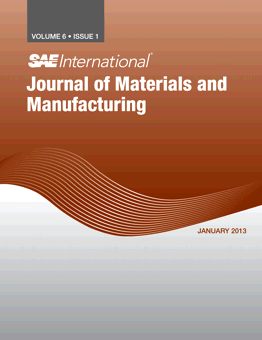
SAE International Journal of Materials and Manufacturing
Empowering Research for a Sustainable Manufacturing FutureSAE International Journal of Materials and Manufacturing, published by SAE International, is a leading peer-reviewed journal that focuses on the advancements and research in the fields of materials science and manufacturing engineering. With ISSN 1946-3979 and E-ISSN 1946-3987, this journal is an essential resource for researchers, professionals, and students who are keen on exploring innovative materials and modern manufacturing techniques. Although the journal currently does not offer open access options, its rigorous selection process ensures the publication of high-quality papers that contribute significantly to the knowledge base in the industry. Recognized within the third and fourth quartiles across various engineering categories, including Industrial and Manufacturing Engineering and Mechanical Engineering, the journal provides an impactful platform for disseminating groundbreaking research. With a converged history since 2002 and a comprehensive approach to critical topics in mechanics of materials, it empowers the academic community with vital insights, trends, and methodologies that propel the future of manufacturing excellence.